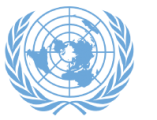The United Arab Emirates would like to thank Germany for organizing today’s open debate and bolstering the Security Council’s work on climate change. We would also like to thank the briefers for their presentations.
In the years since Germany and other Member States first addressed the topic of climate security in the Council, we have long moved past the point of recognizing that there is a link between climate change and security. There is ample evidence around the world, including in our region, of how droughts, extreme weather patterns, desertification, and other climate impacts lead to societal unrest, unemployment, competition for resources, and displacement. These factors all contribute significantly to conflict, violence, and recruitment by terrorist groups, with disproportionately negative impacts for youth and children, women, and persons with disabilities. We have also moved past confusing “securitization” of climate with “militarization.”
So we would accordingly like to raise four points today on how to potentially operationalize the climate-security nexus in the context of the Security Council.
First, we believe that the Council would benefit from enhanced and standardized analysis of the security implications of climate change in situations on the Council’s agenda, building on the work of the Climate Security Mechanism. At this stage, we would support targeted analytical training for mission staff in countries and situations where climate is most relevant, so they can integrate climate into their Council-facing products and their own programming, using comparable methodologies. We would also expect that existing in-country resources – such as UNDP, the humanitarian coordinator, and other agencies – could provide some of this capacity.
Second, we call for further development of the UN’s anticipatory action capabilities. We commend OCHA, WFP, the World Bank, and other partners for their investments in the modeling and analytics to drive disbursement of funding in advance of credibly-predicted disasters and stresses – most often related to climate change. The range in estimates of lives and costs saved by early action is wide – for instance, from $7 to $50 per $1 invested – but demonstrates resoundingly that early action is the direction in which the UN system must travel. We would welcome the use of these climate-linked forecasts in Security Council deliberations, with the objective of mobilizing resources and mandates before, rather than after, a crisis spirals out of control.
Third, we believe in a principle of “do no harm” for Council-mandated missions. Missions should have enhanced guidance and internal controls to ensure that they are not intensifying local climate effects, such as groundwater depletion or deforestation. Renewables should also become the first consideration for mission energy supply, with the added benefit that they are cheaper than diesel in almost all multi-year deployments and create long-term infrastructure for local communities as part of a “peace dividend.” We highlight the work of Energy Peace Partners and the International Renewable Energy Agency in this regard.
Lastly, the Security Council’s response to climate change needs to be coordinated with other parts of the UN system and its partners, and it must be focused on conflict prevention and climate adaptation as two sides of the same coin. As part of the broader concept of anticipatory action, it is clear that resilience-focused development and humanitarian activities must increase in countries that are vulnerable to both climate change and insecurity, in order to curtail the likelihood of conflict. Accordingly, we would expect warnings in the Security Council on climate impacts to elicit commensurate responses in international agencies and their boards, and vice-versa. The UAE is committed to that approach moving forward.
We trust that today’s open debate can facilitate a practical, results-oriented approach to the growing wave of security threats related to climate change. It is the defining challenge of our era, and the Security Council can and must be part of the solution.
Thank you.


